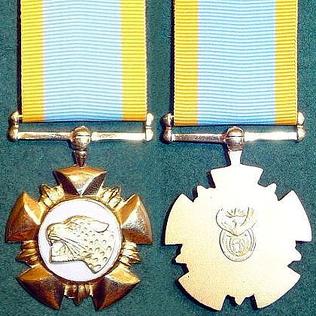
The Nkwe ya Gauta - Golden Leopard, post-nominal letters NG, is a military decoration for bravery which was instituted in 2003, to replace the Honoris Crux Gold (HCG). It is South Africa's highest military decoration for bravery.

The Nkwe ya Selefera - Silver Leopard, post-nominal letters NS, was instituted by the President of the Republic of South Africa on 16 April 2003 and came into effect on 27 April 2003. It is South Africa's second highest military decoration for bravery.
An overview of South African police decorations and medals, which form part of the South African honours system.
South African orders, decorations and medals are those military and civilian orders, decorations and medals issued by the Government of South Africa. The following is a (non-exhaustive) list of these:
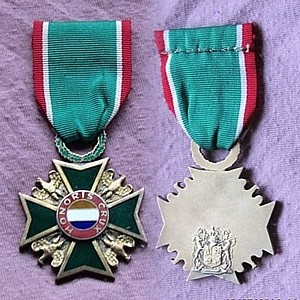
The Honoris Crux of 1952, post-nominal letters HC, is a military decoration for bravery which was instituted by the Union of South Africa in 1952. It was in use from 1952 to 1975 and was awarded to members of the South African Defence Force for gallantry in action against the enemy in the field. It was discontinued on 1 July 1975, when it was replaced by a new set of four Honoris Crux decorations, in four classes.
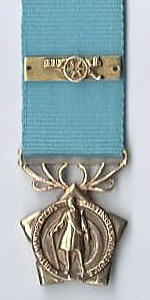
The Van Riebeeck Decoration, post-nominal letters DVR, is a South African military decoration for bravery which was instituted by the Union of South Africa in 1952. It was awarded to officers for distinguished service in the field.
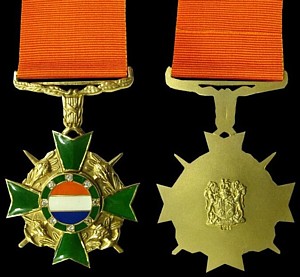
The Honoris Crux Diamond, post-nominal letters HCD, was a military decoration for bravery that was instituted by the Republic of South Africa on 1 July 1975, but never awarded. The decoration was intended for award to members of the South African Defence Force for death-defying heroic deeds of outstanding valour.

The Honoris Crux Gold, post-nominal letters HCG, is a South African military decoration for bravery which was instituted in 1975. It was awarded to members of the South African Defence Force for outstanding acts of bravery while in extreme danger. It was the second most senior in a set of four classes of Honoris Crux decorations which replaced the discontinued Honoris Crux of 1952.

The Honoris Crux Silver, post-nominal letters HCS, is a military decoration for bravery which was instituted by the Republic of South Africa on 1 July 1975. It was awarded to members of the South African Defence Force for exceptional acts of bravery while in great danger. The Honoris Crux Silver was the third most senior in a set of four classes of Honoris Crux decorations, which together replaced the discontinued Honoris Crux of 1952.
The South African Police Silver Cross for Gallantry was a decoration that existed between 1985 and 1989.

The Pro Virtute Decoration, post-nominal letters PVD, is a military decoration for bravery which was instituted by the Republic of South Africa in 1987. It was awarded to officers of the South African Defence Force for distinguished conduct and exceptional leadership during combat operations in the field.

The Honoris Crux of 1975, post-nominal letters HC, is a military decoration for bravery which was instituted by the Republic of South Africa on 1 July 1975. The decoration was awarded to members of the South African Defence Force for bravery in dangerous circumstances. It was the junior in a set of four Honoris Crux decorations in four classes, which together replaced the discontinued Honoris Crux of 1952.
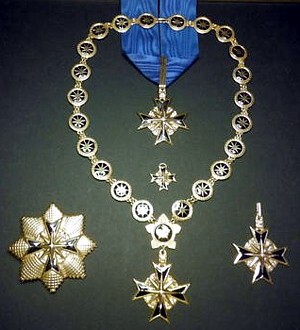
The Star of South Africa, Gold, post-nominal letters SSA, is the senior decoration of two military and five non-military classes of the Order of the Star of South Africa, a South African Order which was instituted in 1975, for award to general and flag officers of the South African Defence Force. The Order of the Star of South Africa was discontinued in 2002.
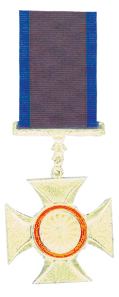
The Gallantry Cross, Gold was instituted by the President of the Republic of Venda in 1985, for award to all ranks for extreme courage or supreme bravery or valour beyond the normal call of duty.

The Gallantry Cross, Silver, post-nominal letters GCS, was instituted by the President of the Republic of Venda in 1985, for award to all ranks for courage or bravery or valour beyond the normal call of duty.

The Star for Bravery in Gold, post-nominal letters SBG, was instituted by the President of the Republic of South Africa in April 1996. It was awarded to veteran cadres of Umkhonto we Sizwe, the military wing of the African National Congress, who have distinguished themselves during the "struggle" by performing acts of exceptional bravery in great danger.
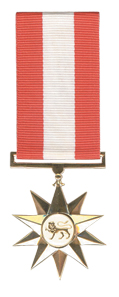
The Gold Star for Bravery, post-nominal letters GSB, was instituted by the President of the Republic of South Africa in April 1996. It was awarded to veteran cadres of the Azanian People's Liberation Army, the military wing of the Pan Africanist Congress, who had distinguished themselves during the "struggle" by performing acts of exceptional bravery in great danger.

The Bravery Star in Silver, post-nominal letters BSS, was instituted by the President of the Republic of South Africa in April 1996. It was awarded to veteran cadres of the Azanian People's Liberation Army, the military wing of the Pan Africanist Congress, who had distinguished themselves during "the struggle" by performing acts of bravery.

The Star for Conspicuous Leadership, post-nominal letters SCL, was instituted by the President of the Republic of South Africa in April 1996. It was awarded to veteran cadres of the Azanian People's Liberation Army, the military wing of the Pan Africanist Congress, for distinguished conduct and exceptional combat leadership during the "struggle".
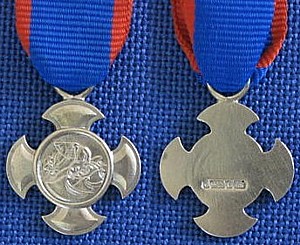
The Woltemade Cross for Bravery, Silver, post-nominal letters WDS, is the lesser of two classes of a South African civil decoration for acts of bravery. It replaced the Union of South Africa King's Medal for Bravery, Silver, Union of South Africa Queen's Medal for Bravery, Silver and Woltemade Decoration for Bravery, Silver, all of which ranked on par with each other and the award of which had been discontinued in 1952, 1961 and 1988 respectively.

















